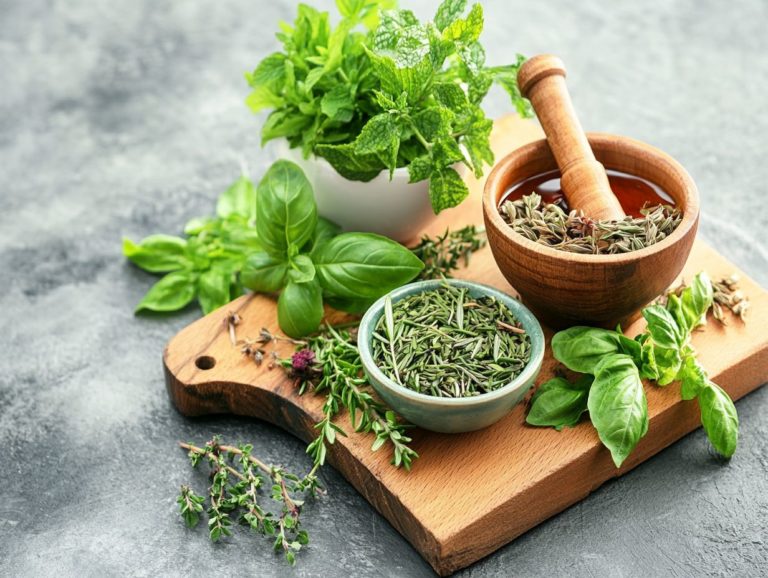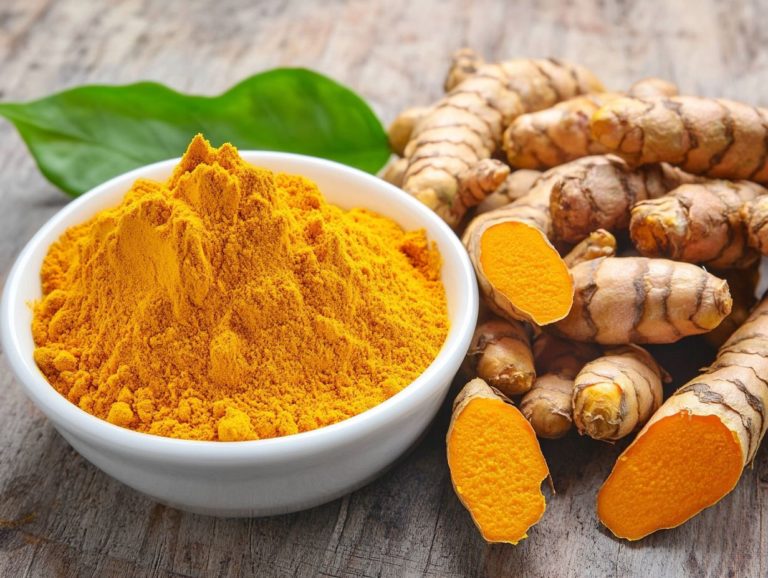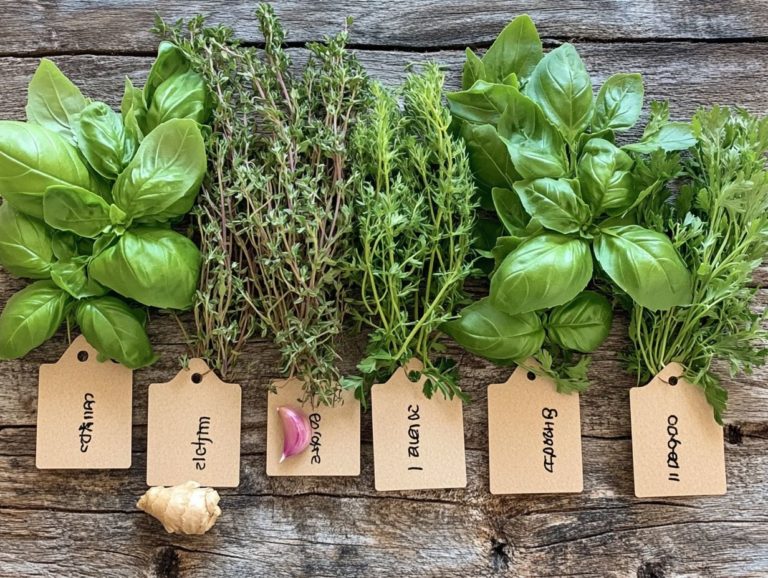Herbal Remedies for Joint Pain Relief
Joint pain can profoundly affect your daily life. Even simple tasks can become formidable challenges.
Understanding the causes and risk factors is essential for finding relief. This article explores common causes of joint discomfort and shares herbal remedies that can reduce inflammation and ease pain.
You ll discover the best herbs to consider and how to use them effectively. We will also explore herbal supplements that support long-term joint health.
Join us on this exciting journey as you embrace a holistic approach to joint pain relief.
Contents
- Key Takeaways:
- What Causes Joint Pain?
- Herbal Remedies for Joint Pain Relief
- How to Use Herbal Remedies for Joint Pain
- Combining Herbal Remedies with Traditional Treatments
- Preventing Joint Pain with Herbal Supplements
- Frequently Asked Questions
- What are herbal remedies for joint pain relief?
- What are some common herbal remedies for joint pain relief?
- How do herbal remedies for joint pain relief work?
- Are there any side effects of using herbal remedies for joint pain relief?
- How long does it take for herbal remedies to provide joint pain relief?
- Can herbal remedies for joint pain relief be used alongside traditional medications?
Key Takeaways:
- Herbal remedies can help reduce joint pain by targeting inflammation.
- Understanding the right methods and dosages of herbal remedies is vital for effectiveness.
- Herbal supplements can help prevent future joint pain and maintain overall joint health.
What Causes Joint Pain?
Understanding the causes of joint pain is essential for effective management. It can arise from various factors, including different forms of arthritis, such as rheumatoid arthritis and osteoarthritis.
These conditions can cause inflammation and discomfort in the joints. Risk factors include age, lifestyle choices, and pre-existing health conditions.
Symptoms of joint pain can range from mild discomfort to significant restrictions in mobility. Pinpointing the cause allows for appropriate interventions, including medications and NSAIDs.
Common Causes and Risk Factors
Joint pain can stem from various causes, especially if you have arthritis. This includes both rheumatoid arthritis and osteoarthritis.
While both types bring discomfort, they stem from different mechanisms. Rheumatoid arthritis is when the body mistakenly attacks its joints, often affecting symmetrical pairs like your hands and knees.
Osteoarthritis, on the other hand, is related to the wear and tear of joints over time, often worsened by age and obesity.
Your lifestyle choices, including diet and physical activity, play key roles in joint health. Awareness of these factors can help you navigate treatment options confidently.
Herbal Remedies for Joint Pain Relief
Herbal remedies are gaining recognition for their ability to alleviate joint pain and provide anti-inflammatory benefits. Many individuals are turning to natural solutions to enhance their joint health.
Effective herbs include turmeric, ginger, and Boswellia serrata. They contain curcumin, known for its remarkable health benefits in reducing inflammation and pain.
These natural remedies complement conventional pain relief methods. This approach may help you manage symptoms while reducing reliance on medications.
Top Herbs for Reducing Inflammation and Pain
In terms of reducing inflammation and pain tied to joint issues, a handful of standout herbs turmeric, ginger, and Boswellia serrata are worth your attention. Each brings its unique health benefits to the table.
These herbs have been cherished for centuries, not just for their culinary applications but also for their remarkable medicinal properties. Take turmeric, for example. It contains curcumin, a natural compound found in turmeric known for reducing inflammation. Research shows that curcumin can significantly lower markers of inflammation in your body.
Ginger also deserves a mention. It contains compounds like gingerols and shogaols that have been promising in easing joint discomfort. Then there s Boswellia serrata, a staple in traditional medicine, packed with boswellic acids that work to inhibit inflammatory processes.
You can incorporate these herbs into your daily meals or opt for them in supplement form. Numerous studies back their effectiveness in managing joint pain and enhancing overall well-being, making them a valuable addition to your health regimen.
How to Use Herbal Remedies for Joint Pain
Utilizing herbal remedies for joint pain relief requires you to grasp the optimal methods of administration and the correct dosages. This knowledge is essential for maximizing their health benefits and ensuring both effectiveness and safety.
Methods of Administration and Dosage
When exploring herbal remedies for joint pain, understanding the methods of administration and recommended dosages is crucial for unlocking their full potential.
Different ways of taking these remedies can greatly enhance their benefits. Consider indulging in herbal teas made from turmeric and ginger. These aren t just comforting; they also provide essential nutrients that support joint health.
For a more potent effect, you might opt for extracts or tinctures, which offer concentrated doses that fit effortlessly into your daily routine. A typical dosage for turmeric ranges from 500 to 1,000 mg per day. Ginger can be taken in doses of approximately 1,000 to 2,000 mg daily.
Topical applications like infused oils or creams can provide localized relief. Applying them a few times a day can bring added comfort. You can also get creative by incorporating these herbs into your meals or smoothies, making it easy to weave these powerful remedies into your everyday life.
Combining Herbal Remedies with Traditional Treatments
By combining herbal remedies with traditional treatments, you can create a holistic approach to managing joint pain. This strategy supercharges your pain relief and enhances the effectiveness of your medications while minimizing potential side effects.
Benefits and Considerations
The benefits of combining herbal remedies with traditional treatments for joint pain are abundant. However, it’s crucial to consider several factors to ensure your approach is both safe and effective.
This integration can enhance your pain relief and reduce inflammation. It allows you to enjoy a greater range of motion and overall improved health. Certain herbal options may even support your body’s natural healing processes, offering a holistic approach to wellness.
However, it’s essential to be mindful of potential side effects. Not all herbal supplements play well with standard pharmaceutical medications. Consulting a healthcare professional is vital in tailoring a treatment plan that minimizes risks while maximizing benefits. This paves the way for a safer and more effective way to manage your joint discomfort.
Preventing Joint Pain with Herbal Supplements
You can effectively prevent joint pain by incorporating herbal supplements into your routine. These natural remedies offer impressive anti-inflammatory benefits while also promoting overall joint health.
Start incorporating these powerful herbs into your routine today for a healthier, pain-free life!
Supplements for Joint Health and Maintenance
Adding the right supplements to your routine can boost your joint health. If you struggle with joint pain, these tips may bring you relief.
Take turmeric, for instance, which is renowned for its powerful anti-inflammatory properties, substances that reduce swelling and pain, thanks to curcumin. Try adding turmeric to your meals for a spicy boost to your health!
Then there s ginger, that delightful herbal powerhouse. It also supports joint function with its natural pain-relieving effects.
Boswellia serrata is another noteworthy contender, often celebrated as a natural alternative for managing inflammation, particularly useful for those dealing with arthritis symptoms. While recommended dosages vary, a common guideline suggests around 500-1000 mg daily for turmeric and ginger, whereas Boswellia can be taken in doses of 300-400 mg.
To truly maximize these benefits, consider weaving these supplements into your morning smoothies, teas, or meals. This way, you can effortlessly integrate them into your daily life, aiding in both the prevention and relief of joint pain.
Frequently Asked Questions
What are herbal remedies for joint pain relief?
Herbal remedies for joint pain relief are natural substances derived from plants that are believed to help alleviate joint pain and inflammation. These remedies have been used for centuries in traditional medicine and are gaining popularity as a natural alternative to traditional pain medications.
What are some common herbal remedies for joint pain relief?
Some common herbal remedies for joint pain relief include turmeric, ginger, boswellia, devil’s claw, and willow bark. These herbs have anti-inflammatory properties and can help reduce joint pain and stiffness.
How do herbal remedies for joint pain relief work?
Herbal remedies for joint pain relief contain active compounds that have anti-inflammatory and analgesic effects. They work by reducing the production of inflammation-causing enzymes and blocking pain signals to the brain.
Are there any side effects of using herbal remedies for joint pain relief?
Like any medication or supplement, herbal remedies for joint pain relief may have potential side effects. It is important to consult with a healthcare provider before starting any herbal treatment, especially if you are taking other medications or have underlying health conditions.
How long does it take for herbal remedies to provide joint pain relief?
The time it takes for herbal remedies to provide joint pain relief may vary for each individual. Some people may experience relief within a few days, while others may take a few weeks. It is important to be patient and consistent with the recommended dosage for optimal results.
Can herbal remedies for joint pain relief be used alongside traditional medications?
Yes, herbal remedies for joint pain relief can be used alongside traditional medications. However, it is important to consult with a healthcare provider before combining any herbal remedies with traditional medications to prevent potential interactions.
Don t miss out on the benefits of these herbal wonders! Always consult your healthcare provider about the best approach to incorporating these supplements into your routine.





